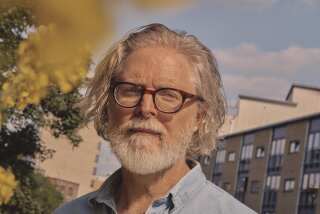Birds and Bees Do It in This Victorian Drama
- Share via
The natural world is not an especially attractive place. In A. S. Byatt’s scrupulously researched novella “Morpho Eugenia,” red ants routinely engage in slavery, dismemberment and hostile takeovers.
Bad as that is, it’s nothing compared to the behavior of the humans in this story, which is set in Victorian England and features a penniless etymologist named William Adamson, who marries the exquisitely peaches-and-creamy Eugenia Alabaster, daughter of landed gentry. Peaches and creaminess notwithstanding, what follows from this union owes less to Henry James than it does to Charles Darwin--or David Lynch.
“We didn’t want to make a Ralph Lauren history piece,” says director Philip Haas, who, along with his wife, Belinda, adapted the novella into a movie called “Angels & Insects.” “What I find so unappealing about the vast majority of films dealing with the 19th century is that there seems to be no authorial voice. They’re just wearing pretty costumes. We wanted to make it feel contemporary. The Victorians were obsessed with sex and death, and that’s what the film is about.”
The filmmakers have not so much reworked the story as brought out what was latent in it, particularly in the character of Edgar (Douglas Henshall), Eugenia’s boorish brother, who might in another context have grown up in Beverly Hills and wrecked his daddy’s car. Readers of the book may be astonished to learn that in Byatt’s first draft, Edgar, and the nastiness he represents, was not included at all. Without giving away the ending, suffice it to say that for the movie, the Haases felt obliged to cover his tracks.
They also had to be careful with the character of Matty (Kristen Scott Thomas), the Emily Dickinson look-alike who acts as a governess and encourages William to continue his work.
“We talked about the necessity of people rooting for Matty,” Belinda says. “If she was going to be a sharp-faced spinster with very little to recommend her except her brain, she wouldn’t be a character for whom audiences would want to scream out to William, ‘Look, look at her!’ She had to be more glamorous than she was in the book. That was one of the things Antonia was worried about. She didn’t want her to be too attractive. She was really pleased with how the character turned out.”
The filmmakers have taken a cue from Byatt and poked fun at Victorian fashions and excesses. The three little girls who are Matty’s charges look like barber poles, and Eugenia has a succession of bad Victorian hair days.
“I also love the fact that the movie embraces Darwin and full frontal male nudity,” Philip says. “It’s got everything.”
More to Read
Only good movies
Get the Indie Focus newsletter, Mark Olsen's weekly guide to the world of cinema.
You may occasionally receive promotional content from the Los Angeles Times.









